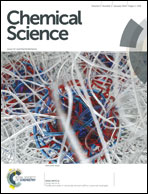Sodium hydroxide-assisted growth of uniform Pd nanoparticles on nanoporous carbon MSC-30 for efficient and complete dehydrogenation of formic acid under ambient conditions†
Abstract
Highly dispersed Pd nanoparticles (NPs) deposited on nanoporous carbon MSC-30 have been successfully prepared with a sodium hydroxide-assisted reduction approach. The modification by NaOH during the formation and growth of particles results in the well-dispersed ultrafine Pd NPs on carbon. The combination of distinct interaction between metal and support and high dispersion of NPs drastically enhances the catalytic performance of the resulted catalyst, over which the turnover frequency (TOF) for heterogeneously catalyzed decomposition of formic acid (FA) reaches 2623 h−1 at 50 °C with 100% H2 selectivity, the highest value ever reported under ambient conditions, comparable to those acquired from the most active homogeneous catalysts. Even at 25 °C, the complete dehydrogenation of FA with a TOF as high as 750 h−1 can be achieved.


 Please wait while we load your content...
Please wait while we load your content...